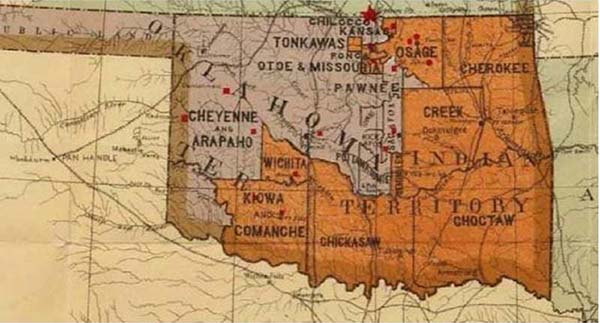
- Details
- By Lenzy Krehbiel Burton
OKLAHOMA CITY—An agreement between the Five Tribes of Oklahoma and the state’s attorney general may be unwinding just days after it was announced.
On Thursday, the Oklahoma attorney general and the Five Tribes of Oklahoma—Cherokee, Chickasaw, Choctaw, Muscogee (Creek) and Seminole— announced an agreement to address how criminal and civil legal matters will be handled in the state. The agreement followed last week’s historic U.S. Supreme Court’s McGirt v. Oklahoma decision that reinstated the Muscogee (Creek) Nation’s reservation across 11 counties in eastern Oklahoma.
Although four of tribes were not explicitly mentioned in the decision, all had signed similar treaties and were subject to similar Congressional actions prior to Oklahoma statehood, leading many tribal law scholars to believe the McGirt ruling could also be applied to them.
The agreement is not legally binding, but would have laid the foundation for proposed federal legislation, according to a news release from the AG’s office.
Less than 24 hours after an agreement in principle, two of the participants are backing away from the agreement. On Friday, leaders of two of the tribes, Muscogee (Creek) Nation Principal Chief David Hill and Seminole Nation Chief Greg P. Chilcoat, said they are not in support of the agreement.
In a letter dated July 17, 2020, Hill writes, in part, to his fellow Muscogee (Creek) Nation citizens:
“I want to inform you that Muscogee (Creek) Nation is not in agreement with the proposed Agreement-in-Principle document released yesterday by the State of Oklahoma.
“The nation will continue to pursue all appropriate intergovernmental agreements to ensure public safety within its borders, as intergovernmental agreements are the hallmark of respect among sovereigns…the Muscogee (Creek) Nation will oppose any proposed legislation that diminishes the Nation’s sovereignty.”
The change of heart apparently caught state officials off guard, with Oklahoma Attorney Mike Hunter issuing a statement late Friday, saying that his office and the tribes had been in talks about the matter for more than two years. The discussions were prompted by the 10th Circuit Court ruling in a case brought forward by Patrick Murphy, a Muscogee (Creek) citizen with a case similar to Jimcy McGirt’s that also wound up before the Supreme Court.
“Since the Murphy case went before the U.S. Supreme Court over two years ago, we have been meeting regularly with the Muscogee (Creek), Seminole, Cherokee, Chickasaw and Choctaw Nations to discuss potential legislation, so Chief Hill’s statements today come as a stunning and regrettable reversal of commitments and assurances to me,” Hunter said in a statement.
“This is neither in the best interest of the state of Oklahoma nor its tribal citizens. Legislation is necessary to clarify the criminal and civil uncertainty created by the McGirt decision,” the statement said.
The chief of the Seminole Nation voiced his opposition to the proposed agreement with a statement:
“Before the Seminole Nation will consider any such framework, the nation requires respectful and meaningful government-to-government discussions directly with the state,” Chilcoat said. “Until such government-to-government discussions occur, and the Nation has an opportunity to fully conduct its own due diligence to any such proposed legislation, the Seminole Nation does not consent to being obligated to an agreement between the other four tribes and the state.”
As of Saturday, it appears the Cherokee, Chickasaw and Choctaw nations are still in support of the proposed agreement that affirms the Five Tribes’ jurisdiction in criminal matters over American Indians in their respective territories and non-Native individuals covered by certain laws.
Some familiar with tribal matters were shocked at the rapid speed an agreement was reached.
 Cherokee Nation Tribal Councilor Wes NofireThe proposed agreement came as a surprise to Cherokee Nation Tribal Councilor Wes Nofire who spoke with Native News Online on Saturday morning.
Cherokee Nation Tribal Councilor Wes NofireThe proposed agreement came as a surprise to Cherokee Nation Tribal Councilor Wes Nofire who spoke with Native News Online on Saturday morning.
“I was elected to the tribal council last fall. There have been no serious conversations about the Cherokee Nation being a part of this agreement since I got on the council. The Cherokee attorney general has provided updates that basically said there were conversations taking place with other tribes about the outcome of the Supreme Court case. But there was never any details of the agreement discussed,” Nofire said.
Nofire says the Cherokee Nation’s constitution does not allow the principal chief to agree to the agreement without having the tribal council’s approval.
“I don’t consider this a very smart move giving up sovereignty right back to the state of Oklahoma. It was an immediate letdown to me. I think it was a dictatorial move to reestablish the state’s jurisdiction over tribal boundaries,” Nofire said.
The Cherokee Nation Tribal Council is meeting on Monday, according to Nofire. He said he is working on a resolution to oppose the Cherokee Nation’s approval of the proposed agreement.
“I just feel as if this was a rushed decision. Whether you understand it or not, something like this agreement needs to be researched.”
Levi Rickert contributed to this article.
More Stories Like This
Navajo Resources and Development Committee Issues Notice on Livestock Inspection RequirementsAmerican Prairie, Tribal Coalition Files Protest Over Rescinded Grazing Rights
Northern Cheyenne Push Back Against Trump Administration’s Effort to Alter Little Bighorn History
Florida Man Sentenced for Falsely Selling Imported Jewelry as Pueblo Indian–Made
Navajo Nation Declares State Of Emergency As Winter Storm Threatens Region
Help us defend tribal sovereignty.
At Native News Online, our mission is rooted in telling the stories that strengthen sovereignty and uplift Indigenous voices — not just at year’s end, but every single day.
Because of your generosity last year, we were able to keep our reporters on the ground in tribal communities, at national gatherings and in the halls of Congress — covering the issues that matter most to Indian Country: sovereignty, culture, education, health and economic opportunity.
That support sustained us through a tough year in 2025. Now, as we look to the year ahead, we need your help right now to ensure warrior journalism remains strong — reporting that defends tribal sovereignty, amplifies Native truth, and holds power accountable.
 The stakes couldn't be higher. Your support keeps Native voices heard, Native stories told and Native sovereignty defended.
The stakes couldn't be higher. Your support keeps Native voices heard, Native stories told and Native sovereignty defended.
Stand with Warrior Journalism today.
Levi Rickert (Potawatomi), Editor & Publisher
